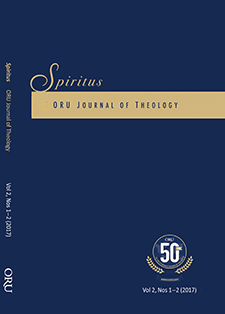Wonsuk Ma: Tragedy of Spirit-Empowered Heroes
 Wonsuk Ma, “Tragedy of Spirit-Empowered Heroes: A Close Look at Samson and Saul,” Spiritus: ORU Journal of Theology, 2:2 (2017), pages 23-38.
Wonsuk Ma, “Tragedy of Spirit-Empowered Heroes: A Close Look at Samson and Saul,” Spiritus: ORU Journal of Theology, 2:2 (2017), pages 23-38.
It was with joy that I read through this perceptive article by Dr. Wonsuk Ma. Dr. Ma is a Pentecostal scholar whose ministry experience was gained in four countries. A large portion of his spiritual and academic development grew in the Philippines where he and his wife were engaged in evangelism, church planting among mountain tribal groups, and heavy involvement with the Asia Pacific Theological Seminary. As a result of his enriching experiences, he developed a strong sense of what it means for Pentecostals to undertake ‘Mission in the Spirit’. Dr. Ma is both a skilled writer and teacher. Indeed, his insights serve as valuable resources to the wider Body of Christ.
This short article, focusing on the tragic examples of Samson and Saul, was motivated by the dire need to address the issue of moral failure in charismatic leaders. In particular, the question being explored is whether the intention of the Spirit’s presence includes both internal transformation as well as empowerment for external tasks. Dr. Ma sets out to prove that the internal working of the Spirit is no less important than the outward empowering. His goal in writing this article is to demonstrate through systematic examination of the stories that these heroes’ failure to receive the private and internal transformation of character led to their ministry failure.
Because this is a topic so close to my own heart, I was more than delighted to read what this scholar had to say. Though there are several other characters whose lives may have been examined, Samson and Saul were chosen because of the frequency in which the Spirit is mentioned in their stories (four positive mentions for Samson – Judg. 13:25; 14:6,19; 15:14, and ten mentions of ‘spirit’ for Saul: five refer to an evil spirit from God – 1 Sam. 16:15,16,23; 18:10; 19:9, two to the Spirit’s departure and opposition – 1 Sam. 16:14; 19:23, leaving three positive references – 1 Sam. 10:6,10; 11:6).
A great insightful from Dr. Ma is that these initial experiences of the Spirit with these men (Judg. 13:25; 1 Sam. 10:6-9) were:
- more private than public, away from people,
- with no enemy or danger coming against them, and
- with no public exploit immediately undertaken.
What does it mean to be made restless by the Spirit? What does it mean to have a new heart?
Their primary experiences are described as Samson being ‘agitated’ and Saul was ‘turned into a different person’, and ‘having received another heart’. What does it mean to be made restless by the Spirit? What does it mean to have a new heart? The author uses a variety of cross references throughout scripture to shed much light on these phrases! Does not the Spirit grant radical inner change which cannot be attributed to human behavioral change?
How do these three observations carry meaning for us? Are our initial experiences of the Spirit meant to take us out of our comfort zones, open our eyes to a new way of perceiving the world around us, to make us more fully aware of our life’s calling and stir us towards it? Are these initial Spirit stirrings meant to cause us to enhance God’s giftedness, and to challenge us to submit to the process of character development? If that is truly the case, then the author correctly argues that divine success through us is dependent upon an appropriate response from us.
Category: Biblical Studies, Winter 2018


